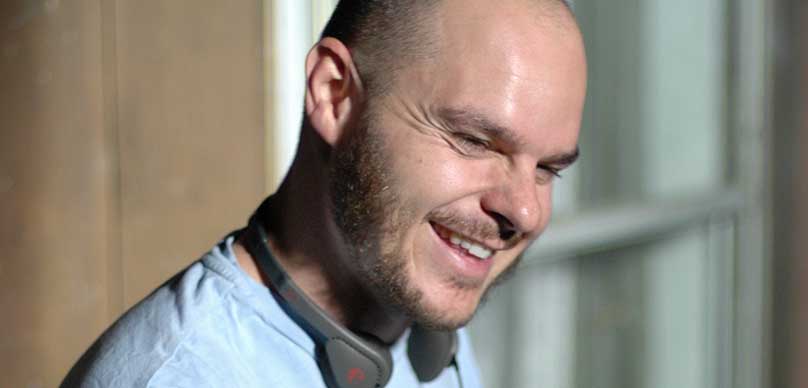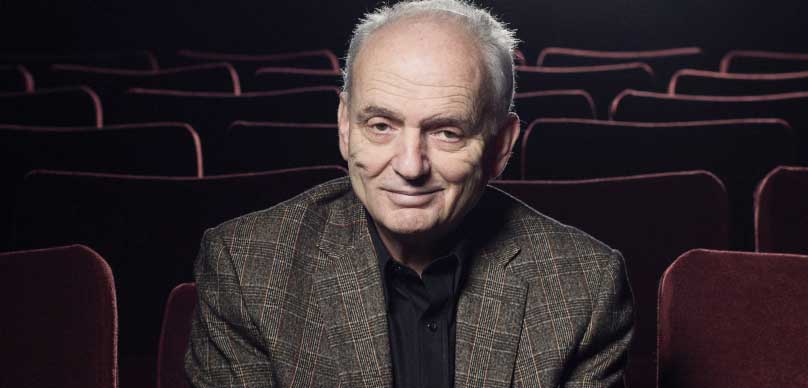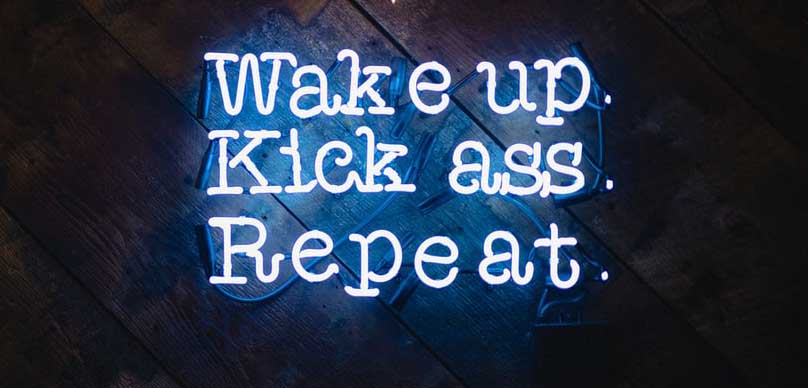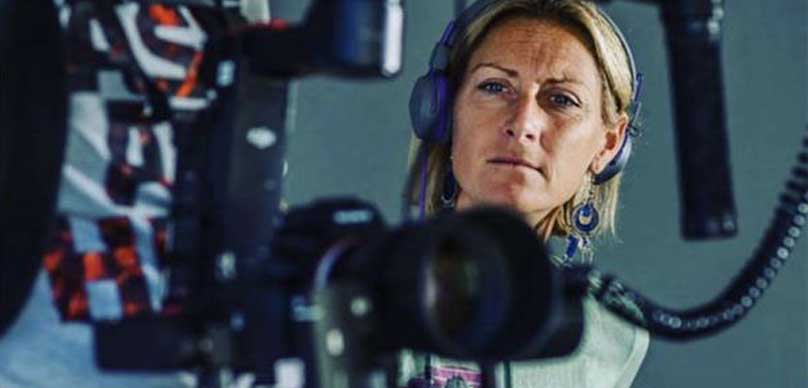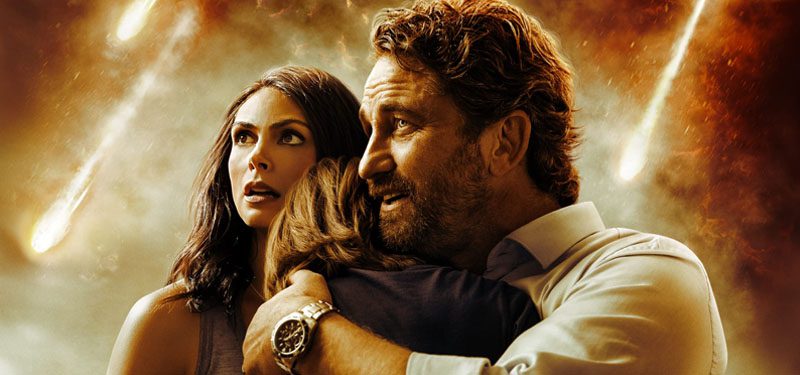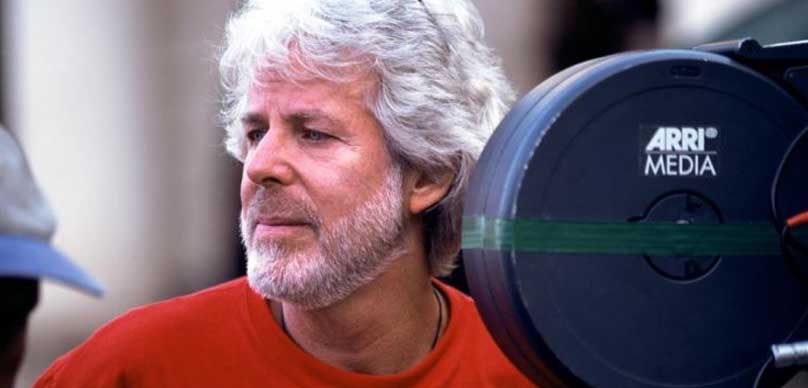In the house, today is the iconic screenwriter and director, of Scott Pilgrim vs. the World, Shaun of the Dead and Blockbuster hit, Baby Driver, Edgar Wright. Edgar has been on the scene making and writing satirical genre films, while also acting for almost thirty years.
He’s here today to talk about his most recent and upcoming film, Last Night In Soho. It is set for release on October 29, 2021, and stars the Queen’s Gambit star, Anya Taylor-Joy. The “Last Night in Soho” title is taken from a song by those Tarantino soundtrack favorites Dave Dee, Dozy, Beaky, Mick & Tich.
The film’s plot: Eloise, a young woman with a passion for fashion design and a strange sixth sense, finds herself transported back in time to 1966 London in the body of an iconic nightclub singer of the era named Sandie. While in Sandie’s body, Eloise begins a romantic relationship; but she begins to realize that Sandie’s life in the Swinging Sixties is not as glamorous as it appears to be and both past and present begin to fall apart with horrifying consequences.
Edgar is the ultimate creator. He’s worked across several genres of entertainment besides films. Some of the said expansion includes television, and music videos production, as well as video games.
Like most up-and-coming creators and filmmakers, we start off on a budget. Edgar began making independent short films around 1993 before making his first feature film A Fistful of Fingers in 1995.
Some other projects he created and directed are the 1996 comedy series, Asylum, the 1999 sitcom, Spaced, and about twenty-plus others since then.
Edgar also created one of the most beloved films in all of geekdom, Scott Pilgrim vs. the World.
In a magically realistic version of Toronto, a young man must defeat his new girlfriend’sseven evil exes one by one in order to win her heart. Scott Pilgrim plays in a band which aspires to success. … No one knows what her past is, but Scott will find out very soon as he tries to make Ramona his new girlfriend.
In 2017, he made waves at the Box office with Baby Driver, grossing $226 million globally. The commercial success of the film was due to the positive word-of-mouth support and flagging interest in blockbuster franchises.
Baby Driver starred Ansel Elgort, who played the role of a getaway driver seeking freedom from a life of crime with his girlfriend, played by Lily James.
Other A-list actors joined the supporting cast of the film– the likes of Jon Hamm, Eiza González, Jamie Foxx, and Jon Bernthal. The Sony Pictures distributed film earned numerous nominations; including three Academy Awards, two BAFTA Film Awards, and two Critics’ Choice Awards.
It was exciting chatting up with Edgar about his signature editing style, writing, and the success of his career.
Please enjoy my conversation with Edgar Wright, and be sure to check out his film Last Night in Soho which comes out tomorrow.
Right-click here to download the MP3
LINKS
- Edgar Wright – IMDB
- Last Night in Soho – Tickets
- Baby Driver – Amazon
- Edgar Wright First Feature – A Fistful of Fingers
- Edgar Wright Short Film – Dead Right
- Edgar Wright – Screenplays
SPONSORS
- Bulletproof Script Coverage – Get Your Screenplay Read by Hollywood Professionals
- Audible – Get a Free Screenwriting Audiobook
Alex Ferrari
I like to welcome to the show, Edgar Wright. How you doing Edgar?
Edgar Wright
I'm good. How you doing?
Alex Ferrari
I'm doing great, man. I'm doing great. Thank you so much for coming on the show. Man. I I had the pleasure of watching your hypnotic, beautifully haunting film Last Night in Soho yesterday, and it was beautiful man, it was really, really well. It's like I was telling, telling someone earlier today, it's just so nice. watching a film when you have a filmmaker, a storyteller. You're in good hands. So thank you!
Edgar Wright
Ohh thank you!
Alex Ferrari
So, um, I wanted to jump in first and ask you what was the film that lit the fuse for you to become a filmmaker?
Edgar Wright
I think um, well, it wasn't exactly a film, but it was like a documentary about a filmmaker and it was related to the films. So I was a big film fan from a very early age. And you know, the first time I ever saw was style or size of that generation where, you know, my parents, two brothers each style was Superman Raiders, like Close Encounters, like, and I had a healthy interest in, in genre through that and you know, and certainly through like horror and sci fi and lots of films that I I wanted to see but wasn't old enough to see. thing so I was always interested in in films and in genre. But then the thing that kind of really flipped a switch in terms of I want to be a director, was a documentary on British TV called the incredibly strange film show, which was hosted by Jonathan Ross, you can actually find it on YouTube. And they would eat, they would do. They would do profiles on different directors. They do like Russ Meyer, Jackie Chan, George Romero, john waters, and this is on like network TV. And then there was one episode about Sam Raimi and watching that episode, and at that point, I hadn't seen Evil Dead or evil there too, but I certainly knew what they weren't. And because my parents didn't have a VCR, like, it was films that I was like too young to see at that point, but also, you know, it was not like I was able to see them even on VHS at that point. But seeing this documentary about Sam Raimi and seeing his story about being a teenage filmmaker and basically making a movie in Michigan did just kind of blew my head off I just thought wow, okay, that's what I want to do. And so because around the same time my parents bought me and my brother a secondhand separate camera, it was one of those presidents which went over you know, like a joint like Christmas and birthday present Of course, this was like for me and my brother so it was like one present went over for events. That's awesome. Hi, so my mom dad really so this was this was like a big deal present and so but so I had this separate camera and then I saw this documentary where Sam Raimi was making super eight films at school and then like you know, a matter of years later he's making a horror movie. So I just like completely that was the lightbulb moment and then after that I saw Evil Dead two first and then later saw Evil Dead because there was a period where it was banned in the UK and earlier not so that was the thing it was sort of like evil that too but through this documentary
Alex Ferrari
So so that brings me to your to the next question. Dead Right? I how did you get? How did you make it? I know we shot on super, super VHS for everyone listening Dead Right was one of your first short films, correct?
Edgar Wright
I mean, it's not a short film. It's like 70.
Alex Ferrari
It's quote unquote, a short film.
Edgar Wright
Um, so I, the first thing I did was make shorts in my school friends. And, you know, based around like impressions of celebrities that they could do. So I did this kind of silly, like, sort of so action spoof. That was about five minutes long. I won't mention like the name of the film because the the celebrity that it was based on has been involved in tech and national scandal.
Alex Ferrari
Fair enough. Fair enough.
Edgar Wright
Just happily like white from my CV. Yes. American people understand it is but British people were so I just I skip over that one. Sure. He's kinda like city comedy shorts. And then I made an animated film. For competition on TV, about wheelchair access in cinemas for this comic relief and So this national competition and I won the competition and I won a video camera which I previously would not have been able to afford. So once I got the video camera then it was around the time I was like 17 then I was really off to the races where I started making these longer form light films with my friends at school, one of which was dead right? So I did like I did three I did that superhero movie, it was called carbolic soap. Then I did a Western fistful of fingers not not not the film version, the video version, like the video version and then the final one I did was an It was a cop film called dead right, which was i'd shot like, over like Easter's, and summers, and I think there's like there's a lot of people in that movie I kind of figured as a sort of indie filmmaker or amateur filmmaker, that the more people that were in it, the more people might buy a copy
Alex Ferrari
It's great marketing good marketing.
Edgar Wright
People might buy a copy and the more family members might buy it like dead right and I was only 18 I think I sold like kind of 200 copies of it. And like 10 pounds each or something like that. go nuts nothing bad nothing better
Alex Ferrari
That to better return at all. Now what were some of the biggest lessons you learn from shooting those early films and I'm assuming dead right by the way was like a precursor to Hot Fuzz.
Edgar Wright
I mean, I didn't know that at the time Sure, of course. I mean, in a weird way the thing the thing actually sort of I think for I thought about kind of doing something more with dead right but then in a weird way Hot Fuzz is an inversion of dead re dead right there's this kind of like without without any like explanation. Like my friend Edward Scotland was playing like an American cop in you know, we're in like Somerset, where I was, where I'm from. And there was no explanation for why there was an American cop in this town. But then in a weird way the whole process was so doing some of the same things but just inverting it like so it was like doing an American style cop film in an English village with English actors. So that to me was more interesting than the idea of just having like a sort of, you know, I mean it dirty Harry's boobs had been done to death by that point you know, but that's it that's what I did did right. I think the thing I learned and this is something that I learned during my own stuff where I was like shooting and editing myself is the lesson that I learned that then you know, I kind of didn't kind of take heat up on the next thing. I think the thing that I learned during this stuff on video was just about coverage and editing because I did write I operated it I edited it you know i was i was there wasn't cameraman it was just me. Whatever Tree Lighting there was just me but thing is I just knew like WhatsApp very quickly, what how many shots and angles you need to edit something. And so kind of the best way of like learning how to direct is like, watching your favorite movies how they're constructed and trying to copy that you know, so the thing that thing Yeah, so so that was the big lesson was just kind of learning about coverage and editing itself.
Alex Ferrari
How did you edit? Did you ever like between VCRs
Edgar Wright
Yeah, like crash edited? Yeah, I've got pretty good at it as well. So did I back in the day. When I went to art college, I went to art college to do audio visual design, and I couldn't get onto the film course I wanted to get onto they said I was too young and said I should go on this other course first, which was like a audio visual design like a foundation course. But they had an edit suite they're like a tape to tape thing. And because it was in Bournemouth, which was a coastal town in the UK, it was like a beach town. Something was interesting as whenever the weather was good, nobody would be a college. Like everybody would go to the beach and the college campus would be deserted. And I took advantage of that because I think in as you can see, I'm not really a sun person. So I was told on my you know, classmates off down the beach sunning themselves, I'm going to get in that edit. So sometimes I'd sort of take the key and I go in on like Saturdays and Sundays and I just learn how to edit. And I'd be editing dead right on that machine tape to tape. And also, I would put together compilations of film clips, like to music, and I also sometimes would re edit movies like I had Evil Dead when it was released on video was re released. Cut by like kind of two minutes by the bbfc that a friend of mine at college had an uncut copy of Evil Dead, which was like ninth generation so it was pretty gnarly, but I thought Well, if I take my first generation copy of the cut version, and then I splice back in the cut bits, then it will be better than the ninth generation version. I remember telling Sam Raimi, I met Sam and I told him this story that I'd actually like, splice together my own VHS copy if he were dead. And I think he looked at me like I was insane.
Alex Ferrari
That's awesome. Now you I mean, you obviously a very prolific writer, how do you approach writing? Do you start with characters? Do you start with plot? What is your approach?
Edgar Wright
I mean, usually there's a storyline. I mean, certainly in in, in some cases, the storyline is very clear in my head, as it was with last night. And so with baby driver it sight eyes, he sort of had had a general idea, but it kept sort of just kind of like developing. But when I'm actually writing, I even if I have the story, a big part of it is just kind of like, I would call it creative procrastination, like you're in the lead up to writing, you're just like reading a lot like reading a lot of research, and listening to lots of stuff that's like, I like you to use music as inspiration. Or, you know, in the case of Soho, he was a lot of watching a lot of films of the period, not not horror films, or thrillers, but just like dramas and documentaries about the period. So it's just that thing to kind of get you in the mood. I think there's that point where you kind of keep sort of creatively procrastinating until, you know, your treatment document gets so much bigger and bigger to the point where now I'm writing screenplays. So it's not necessarily the most efficient way of doing something. But the way that I tend to work, it's a bit different when you have a co writer because then then you know, then it can be a bit more formal. Because, you know, with last and so her whichever it was Kristin was in Cannes, she came on to write the screenplay with me at a point where I had the story sort of, kind of pretty clear, when it was all mapped out. And tons of research, but it was a matter of like then Okay, let's sit down and write the screenplay.
Alex Ferrari
Right? So when you have a partner that keep you honest, is basically what you're saying.
Edgar Wright
So it goes both ways. I mean, I feel like somebody is always gonna be good cop and bad cop. Simon Pegg and he won't, he won't. You won't be annoyed that I say this and he cannot deny it. But definitely in the writing of like Shawn and hot furs. I was definitely good cop. I was like the headmaster, cracking the whip was kind of trying to sort of negotiate down the amount of time we spent in the writing room on a daily basis. Simon is an amazing writer. So it kind of all worked out. But I always found it funny that he was always you know, wheedling around, like, Hey, I might not be able to make it in until, you know, brilliant is, you know,
Alex Ferrari
Now, you've I mean, you've directed some amazing action sequences. I mean, from Scott Pilgrim and obviously, baby driver, how do you approach directing some of these big set pieces? I mean, baby driver alarm had so many car chases, and like big stuff going on, how do you approach it as a director? How do you even approach going to that?
Edgar Wright
I think just a lot of planning basically, I mean, in the cases of Scott Pilgrim and baby driver, you know, you I storyboard everything and you do like and yes obviously is what's written on the page which is almost like it's the screenplay but it's kind of like a beat sheet of what's going to happen then you draw it and then working with a stunt team that is embellished especially with something that Scott Pilgrim with like martial arts is that you know, we would draw like the key frames the what like sadly Les Brown would do is like sort of like he would do the sort of like, for every frame is like kind of like five to eight days. So you know, it's a kind of like sort of like brilliantly embellish on like the drawings because you don't like literally draw every punch with baby driver like there was so much more interesting situation where we have the songs and we know what the duration of the songs are. So we're kind of condensing the action into the songs which is quite good way to do it in a way because sometimes on big budget action movies, they just like shoot and shoot and shoot and just figure out on the Edit and they don't really have like the kind of like the shape of the sequence. But with baby driver and also with last night Sarah which isn't action but similar thing. The scene is only as long as the song so if you have the song kind of locked down and you know what that is, then it's like you kind of fit the story in the action into that and it's quite a good kind of gives you you know, really hard like You know, kind of limits basically, it's so easy because you're not going to start extending the music. It's like, let's make it fit into the song. Yeah,
Alex Ferrari
You're backing in, you're backing into it.
Edgar Wright
Yeah, exactly.
Alex Ferrari
Now, you have also done some, I mean, your comedy and your action. I mean, you You're so known for both those elements and balancing them so well, as a filmmaker, as a writer, how any advice on how to balance comedy and action in the way that you do I mean, even baby driver had, especially the Michael Myers sequence, you know, with the band, how do you balance the two?
Edgar Wright
I guess it's just like, the comedy comes from the characters. So I guess it's sort of if you've got, you know, like, the characters have good voices, and they have their kind of like, strengths and weaknesses, and their attitudes are well defined, then the comedy just comes out of that, you know, so, you know, that Michael Myers scene is just the idea of like, the sort of the one gang member who's kind of, you know, not not quite listened to the debrief. I mean, it's funny, actually, they sort of keep reading on the internet. It's like one of those kind of like, facts, true, you know, trivia facts that goes out there. And it's wrong. Like people say, oh, Edgar Wright wanted to use the Michael Myers mask, and couldn't, they wouldn't, you know, the sort of the Halloween like sort of owners wouldn't let him use it. So he asked Mike Myers instead and got the Austin Powers miles. And that's not true. The original, the original scene was supposed to be to Michael Myers masks from Halloween, and one often powers mask. And that was the joke, because even in the setup of the scene, doc says bio masks separately, so it doesn't look suspicious. So the idea is that they've all gone to the same job separately and bought the masks, but one of them has got the wrong one. So that was the original scene. And then like very close to the shoe, we sort of, we were told that we did have the Halloween mask, and then it was clear that we didn't and to be fair to the, you know, the kind of the owners of the Halloween franchise, they just didn't want the mask to be used in a funny sequence, which is fair. So as soon as I knew that wasn't happening, I called Mike Myers, who had already signed off on the Austin Paris thing and said, hey, I've got a situation I don't have the Halloween mask late. And I sort of So I sort of said, What if it was three awesome powers maths, and luckily, he was like, yeah, great, you know, fine. So I guess you know, I didn't answer your question.
Alex Ferrari
No, no, no, you actually no, it was perfectly exactly fine. No, I think it's like you said the characters. If the characters are well defined, you kind of just throw them together. And, you know, chaos ensues in comedy ensues in so many ways.
Edgar Wright
Yeah, it's all depends on what it is. I mean, in the case of things like shown in the den in the worlds and it's like taking real people and putting them in a fantastical situation, right and the comedy in showing the den and worlds n for example, comes from sort of real grounded, quite naturalistic characters reacting to something absolutely insane. And that was always the thing is that that was the kind of the key thing was showing the dead when we were writing it. And also trying to get across to people was that we didn't want it to be broad. We want it to be real. And this sort of like keep the situation keep the situation serious, like the zombie, like serious and scary and could kill you. And there's the zombies aren't doing anything funny. It's like the cat, the human characters doing the funny stuff. But then even all of their reactions are we just tried to ground it in what we think we would do in that situation, or how kind of like useless we would be in that situation.
Alex Ferrari
Now your new film last night and so how, how did that come to be? I mean, that is a it's a very specific story to come out of your dreams. How did that come out?
Edgar Wright
I think it's like a sort of combination of things. I mean, one part of it is just having grown out with my parents record collection, which was all 16 Records. And there's that box well otherwise, say I had this box, they had a box of records, and they never seen when I was growing up, play those records anymore. So I sort of like you know, when I probably bet as early as six or seven, kind of inherited the vinyl player and put it in my room and just listen to their records. And they didn't have it's funny the records seem to stop down at 1972. So no 70s records or early 80s Records, it was just like this to their albums that they they bought before. So I just use this as that a lot. And then through that you start to form a perception of the decade of obsession with it and a decade that I was not born in I you know, like so obsessed with the decade before you. So that's really interesting. To me, and then. And then that kind of develops in terms of like I kept having sort of time travel fantasies about going back to the 60s, when it'd be great to go back to swing in London wouldn't be great to go to this club or see this film or do that show. And then the more I would think about it, and the more it would kind of just become an ongoing obsession, I started to wonder why that was, and whether that was healthy, and was nostalgia itself, like a failure to deal with the present day was I in retreat. So all of these things start to formulate. And then the other big inspiration, aside from the genre elements are in the film, but the other big inspiration is just being in London, like I've lived in London for 27 years, and I spent more time in the Soho neighborhood than any like couch in any apartment that I've ever lived in. And that place is very sort of, like compelling and somewhat disturbing, sometimes, in terms of a slant entertainment district, like it's the home of the big nightlife district. And right in the middle of London, it's the heart of the film and TV industry. But it also, you know, certainly going back is kind of the heart of the underworld, and the sex industry. And all of these things kind of strangely sort of coexist, like now the Soho that today is sort of been gentrified, in a way, but not quite, it still has the thing that after midnight, the other Soho starts to kind of make itself known. So it's a very, very interesting and odd place, it literally feels a bit like midnight, like Brigadoon the other Soho appears. And so it's a very sort of compelling and interesting place. And I'm the sort of person who can't walk around the city and not thinking about the past. And you know, when you're in buildings that are like hundreds of years old. You know, I'm the sort of person like Eloise in the movie who starts to wonder what these walls seen.
Alex Ferrari
Now, one last question, what advice would you give a filmmaker trying to break into the business today or screenwriter trying to break into the business today?
Edgar Wright
I think it's a matter of like, finding your own voice. And I think the key thing is, and this is a difficult thing to do, the key thing is, is do things that you want to do, not things that you think you ought to do, I think sort of like, just kind of chase after things that you think other people want to see, rather than what you really want to do. Like, you know, you could certainly have success with that, but it but it's things that are from the heart or things that are real passion of yours will always I think score kind of like higher eventually. I guess as well, like, you know, in this day and age, there's more chance of getting your work out there than ever before. I mean, I know that kind of sounds like a pet response. But it's true just in terms of, you know, like people getting their shorts seen on you know, kind of various digital platforms wherever it's like, that wasn't something that existed when I was growing up. So you know, in terms of what people can do, just on social media, or even like on Tick Tock or whatever, or you see this kind of amazing things. People shooting stuff around the world. That doesn't I mean, I'm sure if I was like, sort of like that existed then when I was a teenager, I'd be like shooting kind of like silly comic comedy shorts and putting them online, you know.
Alex Ferrari
So in other words, you didn't look at Shaun of the Dead and said, where the money is, is obviously zombie comedies. And that's why I'm going to do shout out the day. You actually did because it came from the heart.
Edgar Wright
Well, at that time as well when we first started writing it in 2000 You know, there were there weren't there were the zombie film seems amazing to think of this because now you can't kind of move without knocking over a zombie film. Back then it was like the zombies it's sort of been gone from the Zeitgeist, you know, they've been sort of like died off kind of in the 90s essentially zombie movies. And it was around the time when the Resident Evil games were coming out. That's sort of what got me in Simon talking about it through the TV show, we did space. But when we started writing, showing the dead, it wasn't like they were really any other zombie movies on the horizon at all. Maybe there was the Resident Evil movie was the only one. Right? And we were writing the movie. I remember this. I remember vividly Simon calling me saying, hey, if he had the Danny Boyle is doing a zombie movie. And I was like, What the fuck? The first time I heard of 28 days later, and I was so mad. I was so absolutely livid because I was like, No, we're doing a zombie film. And as it turned out, in a weird way, I when I saw the movie, which I think came out maybe like 18 months before ours. You know, it wasn't anything like shown in the dead end in a strange way. It kind of probably tee this up, you know, in the sense that like, You know I think in a way like it helped showing the dead right and then you know, so it was it was actually sort of like a blessing in a way.
Alex Ferrari
Thank you so much for being on the show man I appreciate it and congrats on the new film man. It is a fantastic Feat. So continued success to you, my friend keep please keep making movies.
Edgar Wright
Thank you. Thanks for having me.
Sign up to receive email updates
Enter your name and email address below and I'll send you periodic updates about the podcast.
Please subscribe and leave a rating or review by going to BPS Podcast
Want to advertise on this show? Visit Bulletproofscreenwriting.tv/Sponsors



